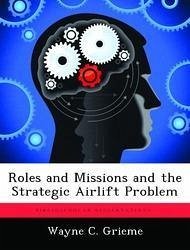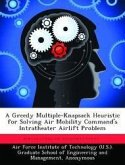The purpose of this monograph is to answer the question; a brigade in 96 hours: can the U.S. Air Force move the U.S. Army in time? In doing so this monograph explores the roles and missions of the U.S. Air Force and its Air Mobility Command (AMC), the Civil Reserve Airlift Fleet (CRAF) and current and future airlift platforms to determine if they meet the future challenges of strategic airlift. This is important because the U.S. Army relies on the U.S. Air Force to move it troops and equipment globally. General Eric Shinseki established the goal of having a brigade that deploys in 96 hours, a division in 120 hours, and five divisions in 30 days. To meet that goal he is developing the medium weight brigade to lighten heavy brigades and increase the lethality of light brigades. If the U.S. Army has units that are capable of being deployed in 96 hours then the U.S. Air Force must have the requisite assets to move those forces. Although the CRAF program facilitates the movement of forces on a strategic scale those assets are not capable of conducting landings in a hostile environment. Additionally, the U.S. Air Force has only one strategic airlifter capable of landing on austere airfields with limited or no logistics. The study of roles and missions begins with the National Security Act of 1947 and through the 1952 Secretary of Defense memorandum on roles and missions. This is followed by a discussion on the CRAF program and how it facilitates the movement of troops and equipment. A separate section details the types of airframe available for strategic lift and to include refuelers that facilitate the long-range capacity of many of the U.S Air Forces airlifters. This is followed by a discussion on future strategic airlift systems and the difficulty of developing cargo and personnel aircraft to fit future needs. Currently, the strategic airlift problem is not solved and will not be in the future unless one of two things happens. First, if the number of airlift assets re
Hinweis: Dieser Artikel kann nur an eine deutsche Lieferadresse ausgeliefert werden.
Hinweis: Dieser Artikel kann nur an eine deutsche Lieferadresse ausgeliefert werden.








